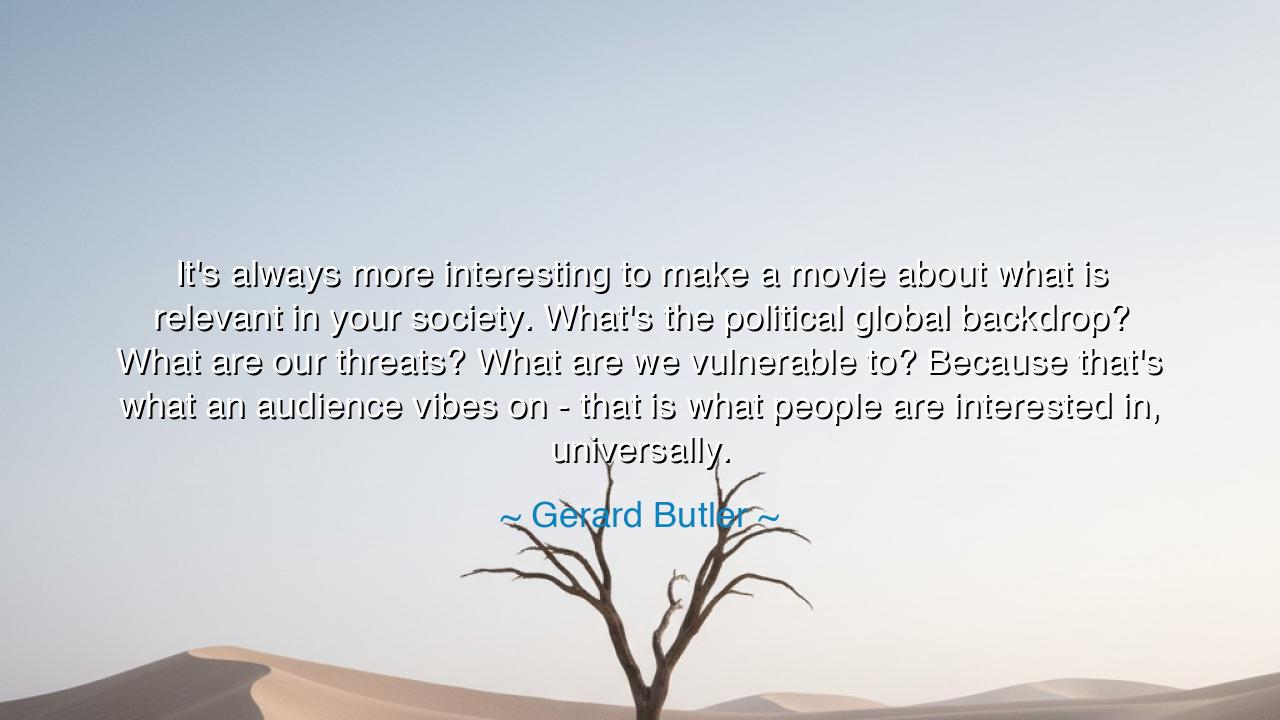
It's always more interesting to make a movie about what is
It's always more interesting to make a movie about what is relevant in your society. What's the political global backdrop? What are our threats? What are we vulnerable to? Because that's what an audience vibes on - that is what people are interested in, universally.






"It's always more interesting to make a movie about what is relevant in your society," speaks the wise Gerard Butler, and in these words, he unravels a timeless truth about the human spirit and the power of storytelling. What, after all, is the role of art if not to reflect the pulse of society, to capture the heartbeat of the world in which it is created? A movie, a play, a story—these are not mere entertainments. They are windows into the soul of a people, a way to understand the truths that shape our world, the forces that drive us, the fears and hopes that live within us all. To tell a story that is not bound to the present moment is to render it irrelevant, a shadow that fades in time. To speak of the world as it is—of its threats, its vulnerabilities, and its universal struggles—is to speak the language that every soul understands, regardless of place or time.
Consider the great epics of the past. The Iliad, the Odyssey, the Aeneid—these are not merely tales of gods and heroes; they are reflections of the societies from which they emerged. Homer captured the very essence of Greek civilization, with its glory and its rage, its honor and its betrayal. The warriors of his tales fought not only for fame but for the ideals of their time: freedom, identity, and glory. In the same way, the Aeneid, crafted by the poet Virgil, was not just the story of a hero’s journey, but a tale of the Roman soul—a story of destiny, sacrifice, and the founding of a nation that would change the world. These stories, though set in a distant past, resonate with the deepest concerns of their respective societies, and in doing so, they become timeless.
In modern times, it is no different. When Gerard Butler speaks of the need to explore the political backdrop of our world, he is calling upon filmmakers to tap into the collective consciousness of their era. What are the threats that loom large over us today? What are the forces that seek to divide, conquer, or oppress us? What are the dangers that lie just beyond the horizon, waiting to strike? These are the questions that matter. Art, whether in the form of cinema or any other medium, must be rooted in the world as it is—the fears, the vulnerabilities, and the global struggles that shape us all. Without relevance, art becomes a hollow echo, a distant memory of something once vital but now forgotten.
Let us take, for example, the iconic film "The Day After Tomorrow", which paints a vivid picture of a world ravaged by climate change. In this tale, the earth itself becomes a threat, rising up to challenge humanity's survival. The film resonates deeply because it speaks to a very real fear that many in society face today—the fear of environmental collapse and the possibility that the world we know may one day be no more. This movie, though a work of fiction, strikes a chord because it taps into the collective unconscious of an entire generation that feels the weight of climate change, political instability, and social division. The film does not merely entertain—it speaks to the fears of our time, and that is why it holds power.
But it is not only the fears we must confront through storytelling; it is also the possibilities that lie in the face of adversity. When we look at stories that depict revolution, resilience, and hope, we find that they too are rooted in the struggles of the society that births them. "Braveheart", a film in which Gerard Butler himself starred, is more than just a historical retelling of a Scottish rebellion. It is a powerful statement about the will to fight against tyranny, about the yearning for freedom, and the sacrifice required to achieve it. The story of William Wallace resonates because it speaks to the deep-seated desire for justice and self-determination, a desire that is as relevant today as it was in the 13th century.
In these moments, we must ask ourselves: What is our role as creators, as individuals in a society that is constantly changing, constantly facing new threats and vulnerabilities? The answer is clear. We must engage with the world around us, acknowledge the challenges we face, and give voice to the struggles of our time. Whether it is through film, art, or literature, we have a duty to reflect the reality of our existence, to speak the truth of our fears, and to offer a vision of hope and strength. We must not retreat into silence or escapism, for the audience, the people, will always seek what speaks to their hearts—the truth, the struggle, the relevant story.
Thus, let the lesson of Gerard Butler guide you in all that you do. Do not shy away from the difficult topics, the hard truths. Embrace them, for they are the very essence of life. Speak to what is relevant, to the struggles and fears that bind us all. In doing so, you will not only create art that resonates with the hearts of your audience but you will become a part of the great narrative that connects us all across time and space. The world is waiting for your voice, for the truth you hold within, for the story that only you can tell. Rise to the challenge, and speak to the world as it is, for that is where the power of art lies.






AAdministratorAdministrator
Welcome, honored guests. Please leave a comment, we will respond soon